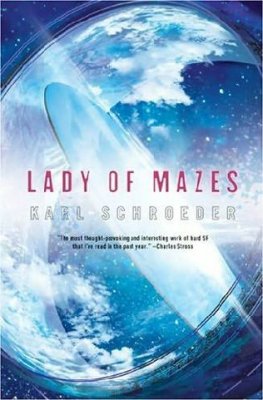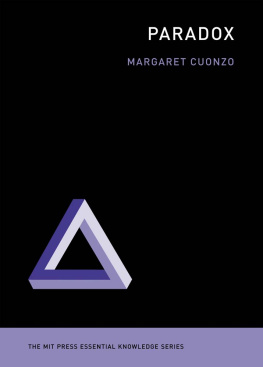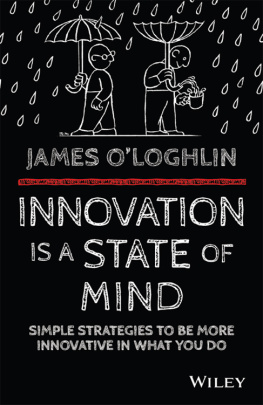Praise for The Power of Paradox
The best strategic insights dont always come through linear thinking. Deborah Schroeder-Saulnier makes a great contribution with her approach.
Greig Woodring, president and Chief Executive Officer, Reinsurance Group of America, Incorporated
Deborah Schroeder-Saulnier has taken ancient and contemporary wisdom about interdependent pairs (paradox, polarity, dilemma, tensions) and added her own thinking and experience to the mix. The result is a sound, practical book for those wanting to maximize and sustain their organizations potential.
Barry Johnson, author of Polarity Management; founder, Polarity Partnerships LLC.
Change your thinking and you change the game in a POWERFUL way! Whether in business or personal life, Deborah Schroeder-Saulnier shows us how 'AND' is often better than OR.
Jim Myers (aka George The Animal Steele)
DEBORAH SCHROEDER-SAULNIER
THE POWER OF PARADOX
Harness the Energy of Competing Ideas to Uncover Radically Innovative Solutions

Copyright 2014 by Deborah Schroeder-Saulnier
All rights reserved under the Pan-American and International Copyright Conventions. This book may not be reproduced, in whole or in part, in any form or by any means electronic or mechanical, including photocopying, recording, or by any information storage and retrieval system now known or hereafter invented, without written permission from the publisher, The Career Press.
THE POWER OF PARADOX
EDITED BY JODI BRANDON
TYPESET BY EILEEN MUNSON
Cover design by Howard Grossman
Printed in the U.S.A.
To order this title, please call toll-free 1-800-CAREER-1 (NJ and Canada: 201-848-0310) to order using VISA or MasterCard, or for further information on books from Career Press.

The Career Press, Inc.
220 West Parkway, Unit 12
Pompton Plains, NJ 07444
www.careerpress.com
Library of Congress Cataloging-in-Publication Data
CIP Data Available Upon Request
Acknowledgments
During my career of 25 years in leadership and consulting roles, I have concentrated my energies and a passion for excellence on the growth and improvement of organizations and the people who work within them. I have been quite aware of the many tensions or conflicting pulls (i.e., decentralized and centralized, local and global, task and relationship, sales and operations, etc.) which cause frustration throughout organizations. I have seen leaders take on a problem-solving mindset with a resulting pendulum-effect, as one leader pulls to their side or interest then ultimately is pulled to the other side or interest. Although I was keenly aware of these paradoxes as I grew from childhood into adulthood, it wasnt until I was exposed to the systems thinking of the late Russ Ackoff in the mid-90s, and then meeting Barry Johnson, founder of Polarity Partnerships, in 2002, that I had language to make sense of this phenomenathe phenomena of interdependent pairs. As a result of this exposure and the deeper learning with the broader polarity community, the value I bring to organizations has been strengthened. In writing this book, I now become a bridge between both communities: polarity and paradox.
I would particularly like to thank the following colleagues who challenged and supported me through a two-year Polarity Mastery program: Beena Sharma, Jake Jacobs, Elaine Yarborough, Allison Conte, Brian Emerson, Laurie Levknecht, Leslie DePol, Michael Rawlings, Patrick Masterson, Kathy Anderson, Peter Dupre, Cherie Woodbury, Cliff Kayser and Clare Dus, and especially Margaret Seidler for giving me the nudge to get the book going!
Countless insights have come from working directly with a wide variety industries and organizations across the world. I would like to give special thanks to the many leaders and client organizations that contributed to the book their real stories to help advance paradox thinking in others: Greig Woodring, CEO, Reinsurance Group of America; Jim Kavanaugh, CEO, World Wide Technology; Ron Levy, former CEO, SSM Health Care-St. Louis Network; Harlan Kent, CEO, Yankee Candle; Pamela Perlmutter, director of development and public relations, Paraquad; Kerry Weiner, MD, chief medical officer, Jerry Wilborn, MD, FCCP, and Rene Toledo, executive director Chicago RegionIPC The Hospitalist Company. Thank you, also, to the many leaders and client organizations that chose to be disguised in the book in order to protect confidentiality.
Sincere thanks goes to my former colleagues in the Clarion Group who directly contributed to this book: Bill McKendree, Chuck Andrew, John Helmkamp, Jon Wheeler, Roy Maurer, Wendy Brown Helmkamp, Darcy Topper, Kim Camire, Liz Mancini. A special thanks to Michelle Turnbull for her development of the models.
I benefited from the learning laboratories provided by previous employers: John Sexton & Company, Oakland Park Inn, Boeing, Hussmann, Ingersoll Rand, Right Management, and for exceptional work with colleagues in St. Louis and around the world. Special thanks to Jim Appleton and Chris Pierce-Cooke, executives who took special interest in both/and thinking and applied it early on.
I appreciate the support of Ward Klein, CEO, Energizer; Lori Jacob, CEO, Junior Achievement of Greater St. Louis; and Jim Myers, aka George The Animal Steele, Scottrade and Ameren. And thank you to Chris Chadwick, who enabled me to bring paradox thinking to groups of leaders throughout the St. Louis community during Leadership St. Louis, a Focus St. Louis program; and to a group of adults at Living Lord Lutheran Church who embraced paradox thinking law and grace once exposed to the phenomena of and.
My academic debts are large: Dr. Robert T. Anderson and the late Dr. Herbert Jackson, professors at Michigan State University; the late Dr. Glenn White, professor at the University of Missouri, St. Louis; Dr. Jeff Haldeman, professor and doctoral dissertation committee chair at Webster University; Warren Bennis; John Gardner; Edgar Schein; Jay Galbraith; Jim Collins; Ram Charan; Carl Rogers; Gestalt principles; work of Daniel Denison; John Kotter; and Ned Herrmann.
I am particularly fortunate to have Kathy Pennell Cooperman as a colleague and a friend. We have been there for each other over these last 25 yearsno matter what!
And special thanks to Michael Xu, a dear friend in China whose perspective validated the need for this thinking across Eastern countries, not just the Western world.
Of course, books dont just happen in a vacuum. They have to make their way through a work life full of other commitments. My deepest gratitude to the team at Career Press: Ron Fry, Michael Pye, Laurie Kelly-Pye, Jeff Piasky, Kirsten Dalley, and Jodi Brandon.
And a very special thank you to my agent, Maryann Karinch, who has been a joy to work with. We have experienced many examples of paradox throughout the process of writing this book: needing to balance activity and rest, work and play, structure and flexibility. It has been a great journey and I have learned much. Thank you, Maryann.
Finally, work itself is only a part of a much larger life, in my case one shaped by my family, my childrenimmediate and extendedwhom I love very much! My daughters, Tiffany and Brittany, provide me with love and laughter on a daily basis. My husband, Tom, has been by my side all the way, as my sounding board and my best friend. My mother and father have been inspirational to me. Both have taught me excellence and humilityMom, an exceptional artist, and Dad, a powerful pastor. I am truly blessed!






